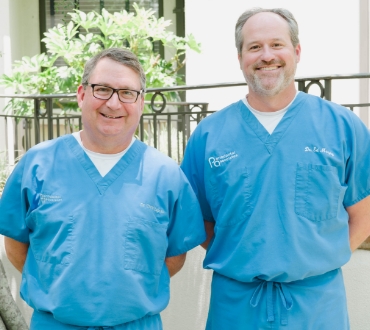Dental implant surgery is often a great choice to replace damaged or missing teeth. One of the main questions you may have regarding the process is how long your recovery will take.
Although everyone is different and individual recovery can vary, most people recover from dental implant surgery in about 3-4 days. The entire process, from start to finish, may take about three to six months.
To understand more about the recovery process, it is helpful to learn more about what occurs with dental implants.
What Is the Dental Implant Process Like?
Dental implant surgery involves inserting an artificial tooth root, often made of titanium, which is placed in the jawbone. Over the course of 3-6 months, the implant bonds or fuses with your jawbone.
A small abutment attaches to the implant. After the healing process is complete, an artificial tooth or bridge is attached to the abutment. According to the American Dental Association, a dental implant is a great long-term option for restoring teeth.
What To Expect After Dental Implant Surgery
Right after the procedure, your mouth will likely continue to be numb from the anesthesia given during the procedure. This will gradually wear off over the next few hours. If you opt for sedation to help you relax, you might continue to feel a bit groggy for a few hours and should plan to have someone drive you home.
After implant surgery, it is normal to experience the following:
Bleeding
Some minor bleeding after implant surgery is considered normal. But bleeding tends to be less than if you had a tooth extracted. You may be asked to bite down firmly on a piece of wet gauze for 23-30 minutes to help stop bleeding. Excess bleeding after implant surgery is uncommon.
Swelling
It is also common to have minor swelling after the surgery, which may occur 2-3 days post surgery. Swelling typically subsides after a few days. Consider using an ice pack and applying it to the side of the face for about 15 minutes at a time on the day of surgery. This may help decrease swelling.
Pain Management
Most people only feel mild discomfort after having dental implant surgery. Usually, over-the-counter pain medication is enough to control discomfort. If pain increases or does not go away in a few days, contact your dental provider.
Eating and Drinking Guidelines
Try to choose soft foods for the first few days after implant surgery, and chew away from the implant site. Err on the side of caution and avoid foods that can get stuck in your teeth, such as seeds and popcorn. Even if eating is a challenge, be sure to eat healthy foods, which help with healing. Most people can return to a normal diet in about a week to 10 days.
Activity Restrictions
On the day of surgery, you may feel a little tired, especially if you were given sedation. Avoid exercise two to three days post surgery as physical exertion may lead to increased bleeding and pain.
Usually, most people can resume their regular activities in a few days. But it is best to discuss activity limitations with your periodontist, especially if you participate in vigorous activities.
How Long Does It Take to Heal?
The healing process from implant surgery comes in a couple of stages. The initial swelling and sensitivity right after the procedure may take a few days to go away. The time it takes for the implant to bond, and overall healing takes longer.
According to the American Academy of Implant Dentistry, the healing process for the implant to bond with the jawbone can take a few months. But during this time, you can engage in your normal activities.
Success rate
Studies show that dental implants often heal well and have a high rate of success. For example, research in the International Journal of Implant Dentistry involved 196 patients with one or more implants. Out of the study participants, only three implant failures occurred, which resulted in a 98% success rate five years after the implant was performed.
Before the procedure, your periodontist will perform an exam and take x-rays to discuss whether you are an appropriate candidate. Of course, the success rate of an implant also depends on taking good care of your teeth after the procedure.
How Can I Promote Healing?
People heal at different rates. Various factors play a role in how fast you heal, such as your age, whether you smoke, and underlying medical conditions you may have. But in general, most people only have mild discomfort for a few days after dental implant surgery.
There are several things you can do to promote healing after dental implant surgery. Consider the following:
- Follow your post-operative instructions.
- Do not disturb the surgical site with your tongue.
- Consider using a salt water rinse a few times a day or as instructed by your periodontist.
- Do not suck on a straw.
- Do not smoke.
- Apply ice to reduce swelling.
- Maintain good oral hygiene, including brushing and flossing daily.
- See your periodontist or dentist for regular follow-up visits.
Maintaining a healthy diet is also important. Research in The Open Dentistry Journal indicated that eating a healthy diet has the potential to speed up oral wound healing. Stick to the basics and eat lean protein, fresh veggies, and fruits, and ask your doctor if you should take a multivitamin.
Dental implants are often a great way to replace one or more missing teeth, and they can last a lifetime. If you have any questions about dental implants, we are happy to help. You can also request a consultation with the team at Periodontal Associates by calling (843) 571-0853.
Categories
- Dental Implants (6)












